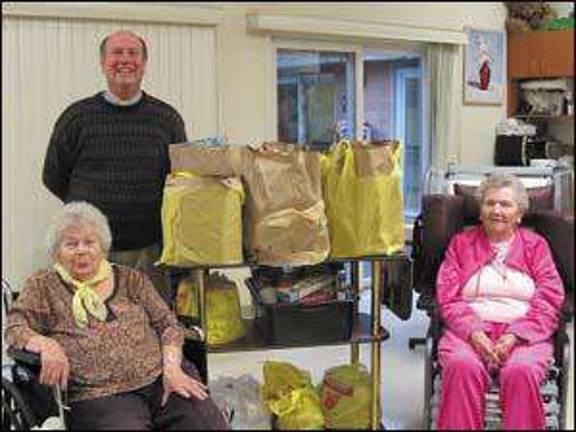Nurse returns from humanitarian mission in Africa

WARWICK - Approximately half the people in the West African Republic of Cameroon live in remote areas where there are no decent roads, running water, electricity, toilet facilities, good schools or modern health facilities. And those who live in cities are surrounded by poverty, disease and squalor. This is where Pat Green, a registered nurse who works in the Medical Surgery Unit at St. Anthony Community Hospital, recently decided to spend three weeks without pay. Green flew to Paris on Nov. 3 and from there to Douala, Cameroon. She connected with Strategic Humanitarian Services, a non-governmental organization based in what was formerly French and part of British Cameroons. Accompanied by dozen or so other volunteers, the remainder of the somewhat torturous journey to their destination, the remote Village of Bamali, was by van. “The rough roads are barely usable,” said Green. “Our entire luggage was strapped on top. They even carry live goats up there.” Green was no stranger to adventure. In 1998 she and nine other nurses traveled to Napal as members of a “People to People” ambassador program. While living in that remote area of the world, they exchanged ideas with other medical professionals. This time, while searching the Internet for another way to serve humanity, she came across a registered British charity called AidCamps International. The organization offers opportunities for short-term volunteer work on Third World development aid projects. That appealed to Green who does not have the luxury to take longer vacations or leaves of absence from her job with the St. Anthony Community Hospital Med/Surg Unit. Pay to volunteer The downside is that volunteers are not only expected to pay for their own travel and living expenses, they also are required to pay a registration fee, converted from the British Pound Sterling to U.S. currency, of about $350 and a donation of at least $815. The organization prides itself on earmarking 100 per cent of all monies to its projects. Even staff members are not salaried. This November, Strategic Humanitarian Services established a partnership with AidCamps International to build a Catholic primary school in Bamali where, according to Green, there are about 100 families and 204 children. The older building had been unfinished and unable to take all of the children of the village. Volunteers, who lived in the same primitive conditions as the natives, were asked to help with the financing and finishing of the building including plastering the walls and the fitting of the windows and doors. The volunteers, who included two Americans, one Australian and 11 British citizens, were not required to have any special skills and their presence was not intended to replace local supervision and labor. But by their presence and financial aid, the project was revived. In spite of the hard work as well as the harsh and sometimes dangerous conditions, Green believes she returned with much more than she gave. “We arrived in Bamali after dark,” she recalled. “All the children, wearing their uniforms, were there to greet our group and there was much singing and dancing. They were so happy to see us that it brought tears to our eyes.” Plans to return Green was also happy that the village chief, who was, at first, skeptical about the presence of the volunteers and kept to himself throughout the project, eventually changed his mind and offered the group his sincere gratitude as well as hand crafted gifts to take home. “It was a wonderful experience,” said Green. “And I plan to return to Cameroon with AidCamps International. We’re going to build a clinic in the Village of Mogni.” There’s much more to the story. While in Cameroon, Green visited a clinic where teen pregnancy, sanitation and a shortage of medication were major problems. And in Cameroon, bribery is the way to do business, even when dealing with the police. She spoke to doctors who see people dying every day from AIDs and met with women who are treated as property and when abandoned, must learn new skills or turn to prostitution just to survive. Green is something of a hero at the hospital. “We are so proud of her,” said Nurse Manager Anita Sultana. “Pat Green is a shining example of a desire to help others that is shared by all our medical professionals at St. Anthony Community Hospital,” said Leah Cerkvenik, executive vice president/administrator of St. Anthony Community Hospital. “We applaud her for this extraordinary journey.” Anyone interested in learning more about supporting future projects in Cameroon or other third world countries can e-mail Green at patgreen@frontiernet.net.